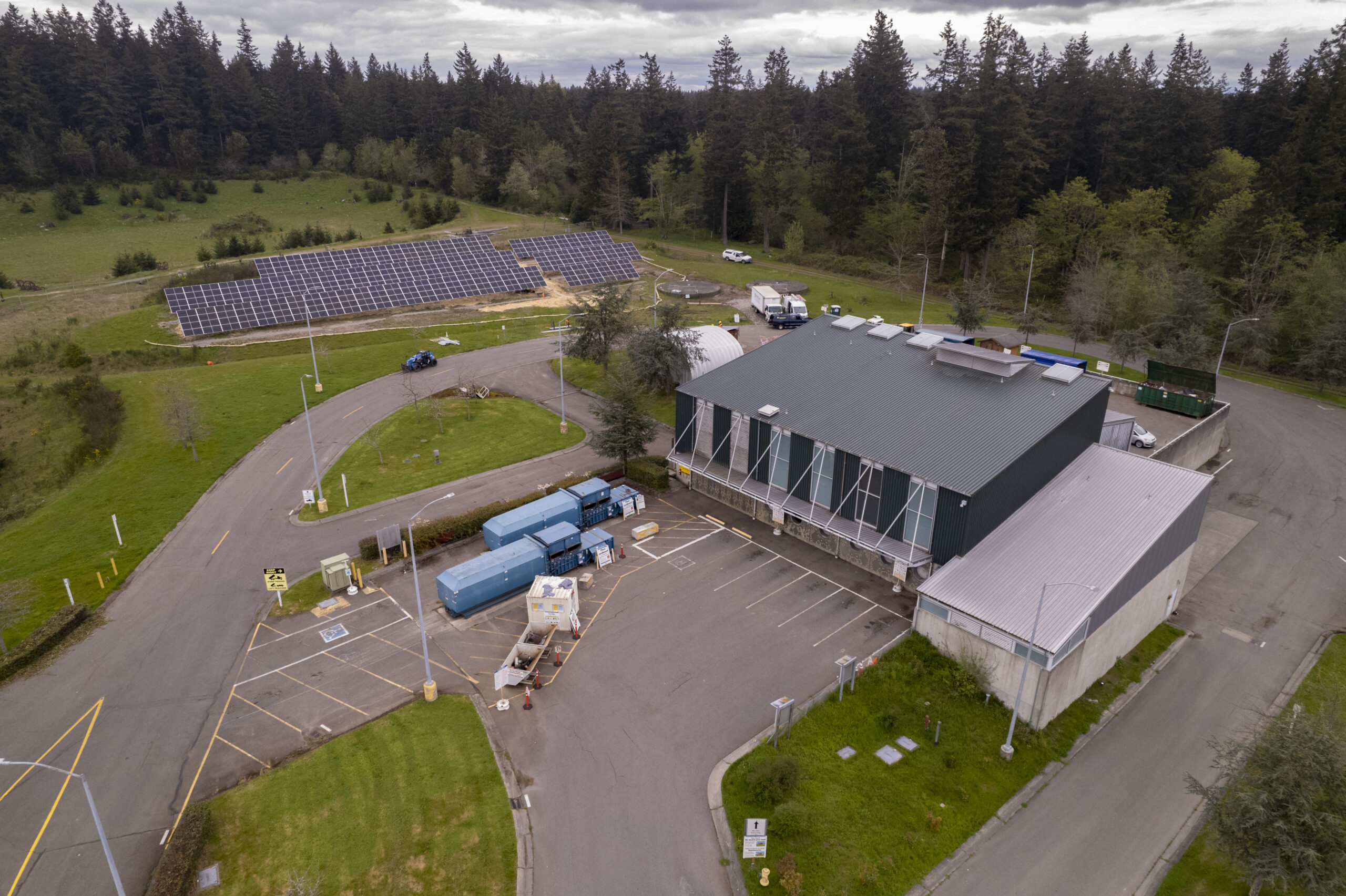Vital Stats
| Certification Status | Zero Energy |
| Version of LBC | 1.0 |
| Location | Vashon, WA |
| Project Area | 9,412 square feet |
| Start of Occupancy | July 2022 |
| Number of Occupants | 2 |
| Number of Daily Customers | 200 |
Project Team
| General Contractor | Integrity Energy Services |
| Solar Installer | Western Solar |
| Structural Engineer | Vector Engineers |
| Civil Engineer | Aaron Couch |
| King County Project Manager | David Broustis |
| King County Solid Waste Division Transfer Station Supervisors | Henry Dotson and Cynthia Adams |
| King County Solid Waste Division Engineer | Francis Gaspay |
| King County Stormwater Engineer | Matt McNair |
| Energy Analysis | Architectural Nexus |
Renewable Energy Information
| Renewable Type | PV |
| Total Renewable Capacity | 100 kW |
| Renewable Location | On-site |
Project Leadership and Story of Project
As the urgency to combat climate change intensifies, the Solid Waste Division within King County’s Department of Natural Resources and Parks is at the forefront of providing eco-friendly recycling and waste disposal services. Funded partly by Washington state’s Solar Grant Program and supported by Stormwater Services’ permitting work, this project aligns with the county’s Clean Water Healthy Habitat Goals, enhancing both environmental sustainability and stormwater management.
The Vashon solar project is a significant milestone in King County’s broader climate strategy, contributing to the goal of certifying 20 county projects as Zero Energy or Living Building Challenge compliant by 2025. Following a similar installation at the Enumclaw Recycling and Transfer Station, these initiatives position both facilities for Zero Energy certification. Cynthia Adams, operations supervisor for the division, emphasizes the project’s impact: “The Vashon solar project is key to the Solid Waste Division’s goals of increasing sustainability in our operations. The project gets us closer to our goal of being carbon neutral in operations by 2025.” This endeavor underscores King County’s commitment to ensuring all capital projects achieve carbon neutrality by 2030, reflecting a robust dedication to environmental stewardship and climate resilience.
Design Process
The design process for the Vashon Recycling and Transfer Station solar project was a collaborative effort focused on sustainability and efficiency. The Solid Waste Division worked closely with local installer Western Solar to maximize the use of previously unused land adjacent to the transfer station. The design included an array of 348 solar panels, carefully positioned to optimize sunlight capture and energy production. Additionally, energy-saving features such as efficient roadway lights, an upgraded HVAC system, and an auto-shutdown mechanism for the station’s trash compactor were integrated into the overall design. This holistic approach not only ensures the facility operates energy-neutrally but also aligns with the county’s broader environmental goals. Coordination with Stormwater Services in DNRP’s Water and Land Resources Division ensured that stormwater planning and permitting were seamlessly incorporated, guaranteeing that the project adhered to clean water standards while generating clean energy.
Energy Systems Narrative
The energy systems narrative for the Vashon Recycling and Transfer Station solar project centers on creating a sustainable, energy-efficient facility. The installation of 348 solar panels forms the backbone of this initiative, generating approximately 172,000 kilowatt hours of electricity annually. This clean energy output is designed to offset the station’s energy consumption, making it energy-neutral. To enhance efficiency, the project also incorporated several advanced energy systems, including efficient roadway lighting, a modernized HVAC system for the scale house, and an auto-shutdown feature for the trash compactor. These systems work in synergy to minimize energy use and maximize sustainability. The combined efforts ensure that the Vashon facility not only meets its operational energy needs through renewable sources but also contributes to King County’s broader goals of carbon neutrality and environmental stewardship.

